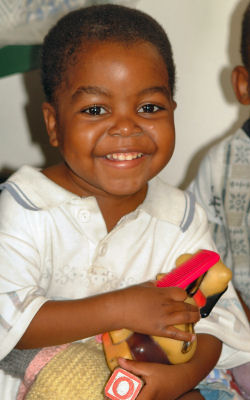Aids Orphans in Zimbabwe

Zimbabwe has a high incidence of HIV/AIDS - nearly 25% of the adult population and one in five orphans are as a result of HIV/AIDS. The current political instability has resulted in a limited capacity for social support. This has been exacerbated by drought. The outcome has been an increase in the number of orphaned and vulnerable children. Nationally the National Aids council of Zimbabwe has set up District Aids Committees with the support of USAID.
SOS Children's Zimbabwe Projects
SOS Children works with the Ministries of Health and Child Welfare and the District Aids Committees to develop programmes that help to strength families.
In Bindura, the SOS Social Centre has, since 2003, been co-ordinating an AIDS outreach programme. This programme reaches out to 2,000 children a year and provides them and their families with food, school fees, basic medical treatment, counselling and psychosocial support. Families affected by HIV/AIDS are offered support to improve their housing and their living conditions. Priority is given to children who have lost both parents and now live with grandparents, older siblings or other relatives, as well as those whose parents are seriously ill.
In Bulawayo, the SOS Social Centre has, since 2003, been co-ordinating an AIDS outreach programme. This programme reaches out to 2,000 children a year and provides them and their families with food, school fees, basic medical treatment, counselling and psychosocial support. Families affected by HIV/AIDS are offered support to improve their housing and their living conditions. Priority is given to children who have lost both parents and now live with grandparents, older siblings or other relatives, as well as those whose parents are seriously ill.
In Waterfalls, Harare the SOS Social Centre has, since 2002, co-ordinated an AIDS outreach programme with the aim of supporting children and families affected by HIV/AIDS in their own community. Following consultation with the local authorities, Glen Norah, a heavily populated suburb of Harare was chosen. Priority is given to children who have lost both parents and now live with grandparents, older siblings or other relatives, as well as those whose parents are seriously ill. The most urgent need was to provide food, basic medical treatment and to support the education of children. In addition the programme aims to improve housing and living conditions. This programme reaches out to up to 2,000 children a year. The long-term goal of this programme is to develop within the local community - people and organisations - full understanding of HIV/AIDS , so that, in the future, the programme is self-supporting within the local community.
If you interested in helping the situation in the Zimbabwe you might like to consider how to sponsor a child in Zimbabwe.